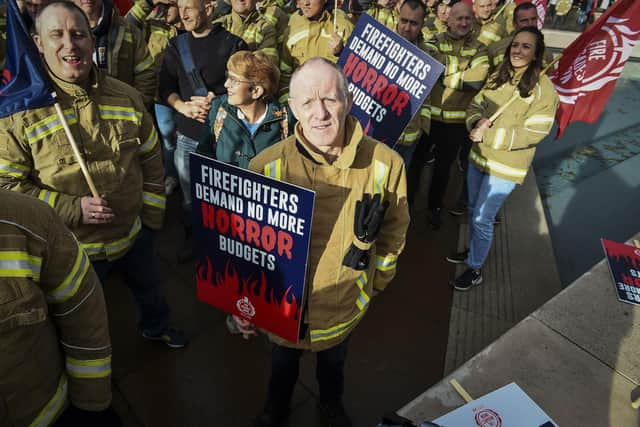Cost-of-living crisis: Why the Scottish Government's offer to firefighters is so 'insulting'
That’s clear when we look at our service and it’s clear when we, as firefighters and control staff, look at our pay packets.
In real terms, pay has plummeted over the past 12 years. In fact firefighters have lost nearly £4,000 if you compare their annual salaries to 2009.
Advertisement
Hide AdAdvertisement
Hide AdThe past 14 years have seen crisis after crisis. From the 2008 banking crash, to austerity, to Covid, and now a cost-of-living crisis.


And working people as a whole have been on the sharp end of every one of them. It is no coincidence. Attacks on our pay, and public sector pay more generally, are part of a long-term drive that is seeing working lives made harder and profits go up.
Firefighters and control staff are about to hold a consultative ballot on whether to accept a 5 per cent pay offer. That’s an offer that is around 5 per cent below the rate of inflation. It is utterly insulting. We’re talking about workers who go to work to save lives every day and do not necessarily know if they’ll come back.
The Fire Brigades Union’s executive council is recommending that members reject this offer. Members will always decide – they are the union. Firefighters and control staff will decide what happens. But no union leadership could in good conscience recommend its members accept something that will leave them so much worse off.
The Covid pandemic highlights how it is working people who keep our communities safe . During the pandemic firefighters took on extra duties because they wanted to help their communities. We delivered food to the vulnerable and moved the bodies of those who had died.
And now we are being rewarded with a real-terms pay cut. It is beyond insulting. We do not deserve this.
But more importantly we cannot afford this. There are some in our number who are going to food banks, who are struggling to make mortgage payments, who cannot afford their skyrocketing energy bills. We simply cannot afford to accept this pay offer.
Inflation in the UK economy is not caused by workers or their wages. We know that. Public sector workers have all faced strangulated wages over the past decade or so, so no one can claim our wages are the driver here. It’s other factors. No one can seriously talk about limiting wages on the grounds it would limit inflation. The 10 per cent inflation we have now follows years of falling real-terms wages.
Advertisement
Hide AdAdvertisement
Hide AdLooking at the fire and rescue service as a whole, the situation is the same. The fire service has been cut to the bone, even though the burdens on firefighters and control staff are set to increase as climate change picks up.
It’s one battle – we need a professional fire service with professionally paid firefighters and effective resources. Anything less lets the public down and lets firefighters and control staff down.
That involves more government funding. Local authorities and fire services can do more in terms of funding their fire services, but the key driver will always be the cash coming from government.
That is why 600 firefighters went to Holyrood on Thursday to reject a poxy 5 per cent pay offer, to demand a fully funded service in the forthcoming budget and to call for an end to the cuts to jobs. We need a fire and rescue service that protects our communities, pays our members and is the envy of world.
- John McKenzie is the Fire Brigades Union’s regional secretary for Scotland.
Comments
Want to join the conversation? Please or to comment on this article.